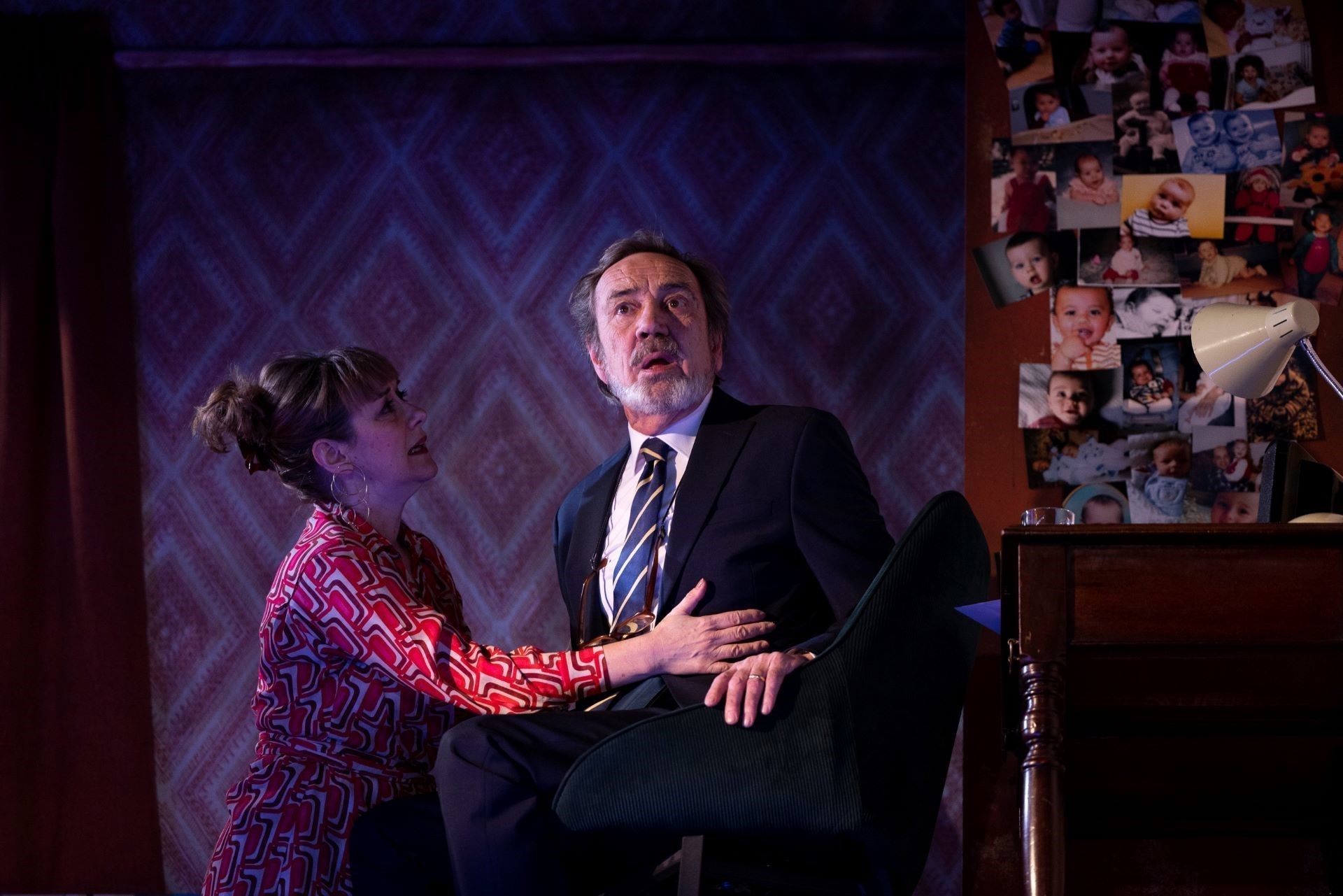The Fever Syndrome has an ambition that places itself firmly in the tradition of the great American family drama (comparisons with Arthur Miller feel the most appropriate), a piece in which the reassessment of ties of blood is played out against a background of issues that touch on the wider society in which its protagonists exist.
In Alexis Zegerman’s new play, receiving its world premiere at the Hampstead Theatre (where 15 years ago the British playwright was writer-in-residence), that latter element is compounded by a sense of scale, a conscious attempt to bring in big ideas, ranging across science and ethics, as serious counterpoint to the family reunion travails experienced by her characters.
Dramatic concentration is emphasised by an action that unfolds over 24 hours in the Manhattan brownstone that is the home of Richard Myers (Robert Lindsay), a medical pioneer famous for his work with IVF treatment (photographs of some of the many children whom he has “delivered” line the walls). But as his Parkinson’s becomes increasingly debilitating, his younger third wife Megan (Alexandra Gilbreath, pictured below with Lindsay) is feeling the strain. The imminent bestowal of a lifetime achievement is set to bring together Richard's three children, from two previous marriages. There’s daughter Dot (Lisa Dillon) with her husband Nate and daughter Lily (Nancy Allsop), and her twin half-brothers Anthony (Sam Marks), a finance highflier from the West Coast, and Thomas (Alex Waldmann), a successful artist now based in Arizona, who’s accompanied by boyfriend Philip (Jake Fairbrother), a newcomer to the family dynamic. The house itself, showing its age and less and less suited to Richard’s condition, feels like a character in its own right, a place where past ghosts will emerge at this time of family summing-up.
The imminent bestowal of a lifetime achievement is set to bring together Richard's three children, from two previous marriages. There’s daughter Dot (Lisa Dillon) with her husband Nate and daughter Lily (Nancy Allsop), and her twin half-brothers Anthony (Sam Marks), a finance highflier from the West Coast, and Thomas (Alex Waldmann), a successful artist now based in Arizona, who’s accompanied by boyfriend Philip (Jake Fairbrother), a newcomer to the family dynamic. The house itself, showing its age and less and less suited to Richard’s condition, feels like a character in its own right, a place where past ghosts will emerge at this time of family summing-up.
But The Fever Syndrome is weaker in its unity of action, with the separate dramas of each of the three children emerging as much in isolation as in interaction. Lizzie Clachan doll’s house-style set puts the siblings’ childhood bedrooms, where such different scenes take place, above the large living room where the family comes together. That sense of compartmentalisation is caught too at the evening meal shared at the end of the first act, as characters talk over one another – true to life, perhaps, in its way, but somehow less than convincingly realised.
Led by the determined Dot, the children's concern about their father’s condition brings on conflict about his wishes for both the house and for Megan’s future. The issue of inheritance is especially urgent for Dot, since her daughter Lily has a rare medical condition (it gives the play its title) that won’t be fully covered by their private medical insurance; that plot element defines the work’s American setting as clearly as the many local details, from childhood sweets to political names, with which Zegerman infuses her story.
Those are at least shared concerns, as to a point is the situation of Nate, a science researcher whose career was sunk by plagiarism charges – a family rendition of a Tom Lehrer lyric on the subject goes straight for the jugular, though seems overcued – as he angles for a niche in the academic foundation that Richard will leave behind. But Thomas’s commitment issues with Philip, who has skeletons of his own, feel almost exclusively private, as does another thematically important strand at the heart of Dot and Nate’s marriage.
The hint of an unexpected closeness between Megan and Anthony feels throwaway more than anything else. The phantom form of a childhood Dot who flits around her father like some ghostly flashback in the latter’s mind is equally disconnected: its whistling wind accompaniment may be spookily atmospheric and hints at something deeper (and dramatically very different), but finally comes across as extraneous.
Zegerman creates her characters well, albeit better in singularity than in unison, and has a style of “smart” writing which can feel overwritten for comedy (at 160 minutes, with one interval, it feels on the long side). It offers plenty to a cast that is led by a barnstorming performance from Robert Lindsay, while the female roles are richer in both nuance and feeling. Roxana Silbert’s production is accomplished, but this dysfunctional family needs more to bring it together.















Add comment